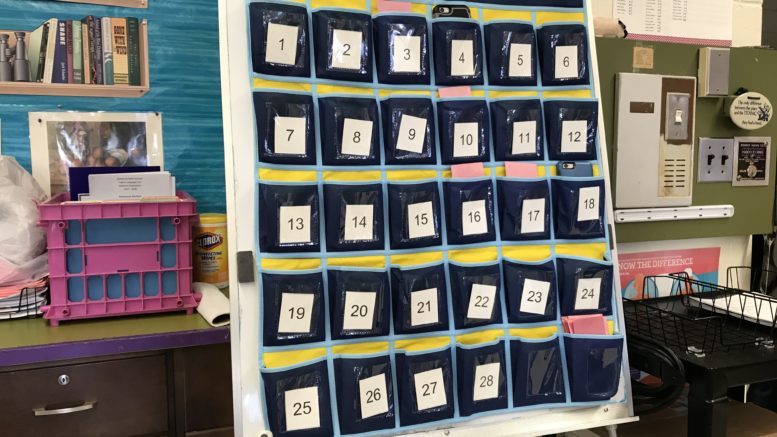The use of cell “homes” has seen an increase in use this school year. Teachers implemented the policy within their classrooms at their own discretion. The idea was introduced in an effort to gain attention and participation during class lessons from students. “Having the cell phone pockets eliminates a whole other layer of discipline in classroom. It helps keep students more focused and [removes] distractions” said math teacher Ms. Ashkin.
Although students understand the reasoning, they have mixed feelings about their property, and a source of entertainment, being taken away. Teachers require that students place their phones in designated pockets at the start of class, often for attendance purposes; but the school claims no liability for any damaged or stolen devices. “I like the idea behind them and the goal of asking kids to focus but I don’t think taking away our cell phones achieves the goal. I feel like if they really want us to focus on our school work there needs to be a cultural shift at Westhill where we prioritize academics instead of taking away student privileges” said Sophie Ciokajlo (‘18). Ciokajlo believes phone addiction needs to be addressed in a positive manner without being reprimanded.
The use of cell phone pockets is often used as a scare tactic, and teachers will warn disruptive classrooms of their ability to implement this policy in order to maintain appropriate classroom behavior. Yet, if a teacher sees a student using their phone they can easily confiscate it without removing devices from every student in the class. “I think that what we do or look up at school on the internet is our responsibility and not the schools. Certain sites are blocked with the school WiFi and they prevent me from doing research or listening to music” said Kate Hollenberg (‘18)
Social Studies teacher Ms. Berkley noted student distraction, and negligence of important topics were becoming a rising issue and barrier to education. “I have grappled with using a phone holder over the past few years. Last year while showing a movie clip of concentration camps being liberated at the end of WWII, a few students were looking at their phones and laughing” Berkley said. “In that moment it became clear to me that many of my students were losing out on their education due to their uncontrollable need to use their phones. I felt as though I had no choice but to institute a policy on cell phones in the hopes that they would grow both personally and academically,” she continued.
As much as we students hate to admit it, use of cell “homes” have had positive effects in the classrooms. “The cell phone pockets keep us focused in class. While I love texting, I find that taking a break from my screen and learning Gov from Ms. Berkley is a very worthwhile experience,” said Will Gold (‘18). Students are more more attentive with minimized distractions. By putting our phones away, it allows us to listen better, work harder, and create a better learning experience.

